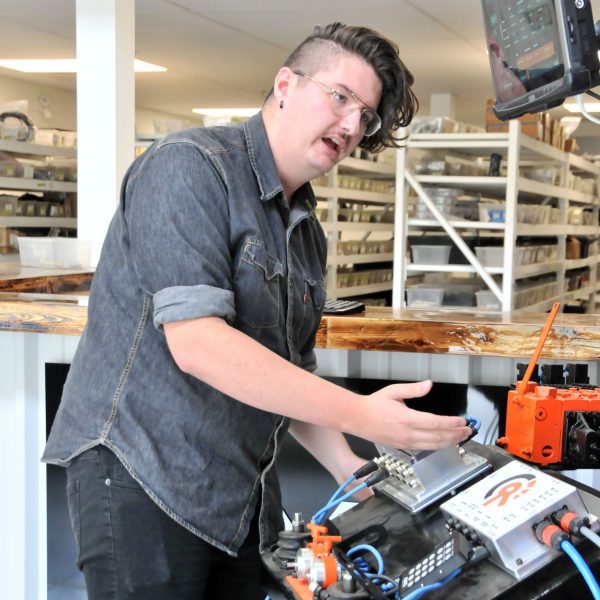What does a children’s day camp leader have in common with an urban agriculture technician, software developer, health and safety assistant, and copywriter?
They are just some of the co-op positions that TRU students are completing this summer. In fact, nearly 125 students are putting their classroom learning to work within BC and across the country, despite the COVID-19 health crisis.
Noah Bergman, a third-year computing science student, is part of the coding team with Axis Forestry, a Kamloops company that rebuilds heavy machinery and equipment for the forestry industry and upgrades the software and computers needed to run the equipment’s electronics.
“Co-op is the place where you can really use the tools you learn,” says Bergman, who is working onsite rather than from home.
“In the real world, you get the practise of finding a problem, thinking through the solutions, choosing the best solution and really getting to see how the theories and tools you learn in your classes work in the real world. You also get the experience of working on projects and with a team. Co-op has reinforced my degree by giving me a way to use the tools I’ve been learning throughout my degree.”

Students in a variety of programs are eligible for co-op, from business and accounting to natural resources, engineering, sciences and arts, and are able to get real-world job experience to build their resumés while earning credits and getting paid.
Get the most out of your LinkedIn profile
Co-op work terms have been a little more complicated during the COVID-19 health crisis, and the number of TRU placements is down approximately 15 percent from last summer.
But Shawn Read, chair of the Career & Experiential Learning department, says, “Considering the environment the pandemic has created, we are quite happy with our work-term placements, Co-op 1000 enrolment, student appointments and wage subsidy progress.”
Read believes that being close to last year’s numbers speaks to the relationships co-op and its coordinators have built over the years with employers of all sizes—whether it’s those with less than 10 people to governments and organizations with thousands on the payroll.
Most of this summer’s placements are in computing science and business and baccalaureate programs, numbering 44 and 36 respectively. Those 80 students represent nearly 65 percent of the total. The balance represents students from sciences, natural resource science, engineering, architecture engineering technician and arts.
Nancy Bepple co-ordinates placements for computing science, math and physics, and says the continued growth of digital technology has kept her numbers strong. The world needs people to fill roles in everything from programming software and websites to artificial and predictive intelligence, 5G, autonomous vehicles, smart devices, computer vision, block chain, network systems and supports running small organizations and large cities.
“There was some impact from COVID—there were some computing science students who were laid off because of the impact of COVID—but most were rehired by other firms,” says Bepple. “Even in a pandemic there is demand for computing science positions. Computer systems and software are core parts of all types of businesses.”

